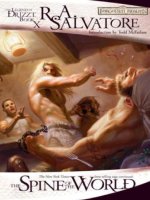WORLD BOOK WORLD BOOK WORLD BOOK 0161 0161
Bạn đang xem bản rút gọn của tài liệu. Xem và tải ngay bản đầy đủ của tài liệu tại đây (1.54 MB, 1 trang )
Chapter 9: GODS & DEMIGODS
The Marsh Gods
Pantheon of the Lost
Whispers and half-rumors speak of a small cadre of
gods beneath the rulership of Iyalphos, for if the Crane
has truly abandoned Khitus, from whence comes the
power wielded by its Shadazim? Cheldar Rejaik Maorkal wears a black sash, to which is bound a small box
(some say from his own left arm bones, though more
suggest carved thakal bone) that contains the last
prayer book of The Marsh Gods, or so he says. Iyalphos
rules the small pantheon which allegedly has an azurat
god (Fija the Watcher), a flea god (Ajarl), and a black
crab god (Daledd) whom some hint was a huckratha
precursor. The only evidence that any of this is true is a
rumored immunity the Crane’s clergy have to the touch
of the coal crab.
fended, as any follower can challenge a superior,
though failure leads to exile or death. Followers allow
their body hair to grow long and move on all fours as
much as possible. They think of themselves as hybrid
creatures, and keep packs of dogs sheltered and fed as
their deity commands.
The Great Pack
Those who claim Baynar is among the few gods never
to abandon Khitus also say he runs at the head of the
Great Pack, a pantheon of gods that help him dominate
the northern wilderness. While rumors are vague regarding the size of the Great Pack, three names repeat
often enough to suggest other demigods worshiped
among the trees beyond the sands: Namha the Hound
(wolfhound demigod of hunting skills), Emrus of the
Howl (timber wolf demigod of pack-laws, hierarchies
and order), and Dathan Moonwolf (man-wolf demigod of lycanthropes and wild-seekers). The sole legend
heard outside of Baynar’s rites talks of the Great Pack
hunting and eventually consuming Raoth the Bear, former divine ruler of the northern woods and mountains.
Iyalphos, the Crane
“The beauty of Iyalphos dissolves now into tears and sand,
and those whose predations steal away his marshes shall
likewise see their environments ripped away. Then shall
they know Crane’s power . . . for their losses shall be fivefold.”
Iyalphos is a god of grace and beauty, a magnificent
white water fowl with the bright eyes of an ancient wiz-
ard, but tinged with sadness. The god’s crane-like form
typifies the creatures and habitats quickly dying off the
face of Khitus. Some say “only fools follow a god whose
animal is near dead,” but even they do not say so openly,
for Crane’s priests wield not a little power when angered.
Clergy of Iyalphos
Shadazim of Iyalphos rage against their world’s decline and direct such wrath against any and all who can
be remotely blamed. Many followers believe Iyalphos
has forsaken Khitus simply because He has no place to
land there and find comfort and refuge. Their god’s absence angers his followers, and they are focused on taking revenge against those who have caused this atrocity.
The Crane’s priests divide into two distinct camps.
Both camps appeal to base emotions, fostering hatred
and revenge, destruction as a means toward an end.
• Those who would stop the world’s decline are
“White-Cranes.” They direct their rage against the
plundering marauders, against the Pale who fund
their destruction, and against the quibbling rulers
or greedy rich who dither or hoard for themselves
rather than stave off the world’s decline.
• “Red-Cranes” are those who are resigned to (or perhaps even hasten) its eventual destruction. They encourage chaos and destruction in all forms. “Topple,
burn, divide . . . through entropy the world will be remade,” they preach, “with Iyalphos properly perched
above the waters drowning all lesser, false gods.”
The Crane’s clergy find no difficulty spreading their
message. All the disaffected of Khitus harbor some inner
dissatisfaction, a kernel of rage that the Shadazim may
nurture. They can point to the world around them as proof
of their god’s disappointment. Those who join in reestablishing His place on Khitus will enjoy a place beneath the
shade of His mighty wings. Iyalphos’s followers know each
other by the hopeful feathers they carry and wear upon
their persons, but they recognize the epic struggle before
them to right their world for their god’s return.
Jaythe, the Panther
Where there are still shadows in the jungles and forests,
Jaythe’s slitted eyes watch over the world, or so her Shadazim proclaim. Their god slips into and out of the world
through absolute darkness. Jaythe is master of the night,
a lurker in shadows. She is a goddess of the hunt, the
predator, the necessity of death, and prowess in battle.
The Panther favors the cunning and powerful, lending
Her blessing to those who kill with purpose, yet shunning
those who kill for no reason. Prey are equally blessed, to
be nurtured and protected, and taken only when needed.
159









